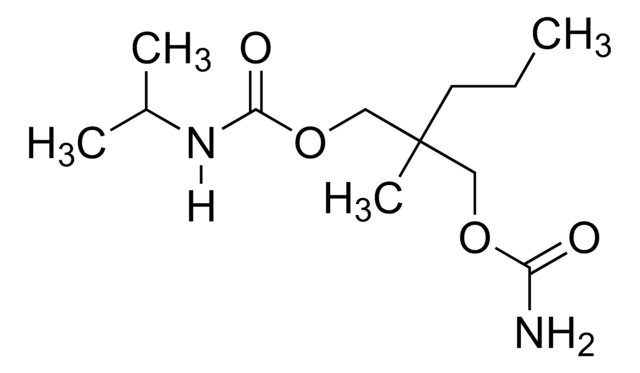M-039
Meprobamate solution
1.0 mg/mL in methanol, ampule of 1 mL, certified reference material, Cerilliant®
About This Item
Recommended Products
grade
certified reference material
Quality Level
form
liquid
feature
Snap-N-Spike®/Snap-N-Shoot®
packaging
ampule of 1 mL
manufacturer/tradename
Cerilliant®
drug control
Narcotic Licence Schedule B (Switzerland); psicótropo (Spain); Decreto Lei 15/93: Tabela IV (Portugal)
concentration
1.0 mg/mL in methanol
technique(s)
gas chromatography (GC): suitable
liquid chromatography (LC): suitable
application(s)
clinical testing
format
single component solution
storage temp.
2-8°C
SMILES string
CCCC(C)(COC(N)=O)COC(N)=O
InChI
1S/C9H18N2O4/c1-3-4-9(2,5-14-7(10)12)6-15-8(11)13/h3-6H2,1-2H3,(H2,10,12)(H2,11,13)
InChI key
NPPQSCRMBWNHMW-UHFFFAOYSA-N
Gene Information
human ... GABRA1(2554) , GABRA2(2555) , GABRA3(2556) , GABRA4(2557) , GABRA5(2558) , GABRA6(2559) , GABRB1(2560) , GABRB2(2561) , GABRB3(2562) , GABRD(2563) , GABRE(2564) , GABRG1(2565) , GABRG2(2566) , GABRG3(2567) , GABRP(2568) , GABRQ(55879)
General description
Application
- Meprobamate solution for neurotransmitter research: Meprobamate is investigated for its impact on the uptake and translocation of pharmaceutical compounds by vegetables, providing insights into environmental interactions and bioaccumulation potential. This research is valuable for understanding how sedative compounds like meprobamate interact with biological systems beyond their primary pharmacological targets (Wu et al., 2013).
- High-purity meprobamate for in vitro studies: The CNS activities of various plant extracts, including their interaction with CNS depressants like meprobamate, are studied to assess potential synergistic effects and therapeutic applications. Such research is crucial for pharmaceutical and neurological studies, providing a basis for developing new therapeutic strategies (Pal and Samanta, 2011).
- Meprobamate as an anxiolytic agent in pharmacological research: Investigations into the CNS depressant activities of different plant roots highlight the importance of meprobamate as a comparative standard in pharmacological research. These studies are essential for validating the efficacy and safety of new anxiolytic candidates (Pal et al., 2011).
- Meprobamate solution for GABA receptor assay: The evaluation of CNS activities of various natural extracts in comparison with known CNS depressants like meprobamate offers valuable data on their mechanisms of action, particularly concerning GABAergic activity. This research supports the use of meprobamate as a benchmark in neuropharmacological assays (Pal et al., 2009).
- Meprobamate research compound for biochemistry labs: Studies on the CNS effects of botanical extracts using meprobamate as a reference drug help delineate the pathways involved in CNS depression and provide a pharmacological basis for the use of these plants in traditional medicine. This kind of research underpins the development of novel anxiolytic drugs derived from natural sources (Pal, 2008).
Legal Information
related product
Signal Word
Danger
Hazard Statements
Precautionary Statements
Hazard Classifications
Acute Tox. 3 Dermal - Acute Tox. 3 Inhalation - Acute Tox. 3 Oral - Flam. Liq. 2 - STOT SE 1
Target Organs
Eyes
Storage Class Code
3 - Flammable liquids
WGK
WGK 2
Flash Point(F)
49.5 °F - closed cup
Flash Point(C)
9.7 °C - closed cup
Certificates of Analysis (COA)
Search for Certificates of Analysis (COA) by entering the products Lot/Batch Number. Lot and Batch Numbers can be found on a product’s label following the words ‘Lot’ or ‘Batch’.
Already Own This Product?
Find documentation for the products that you have recently purchased in the Document Library.
Our team of scientists has experience in all areas of research including Life Science, Material Science, Chemical Synthesis, Chromatography, Analytical and many others.
Contact Technical Service











